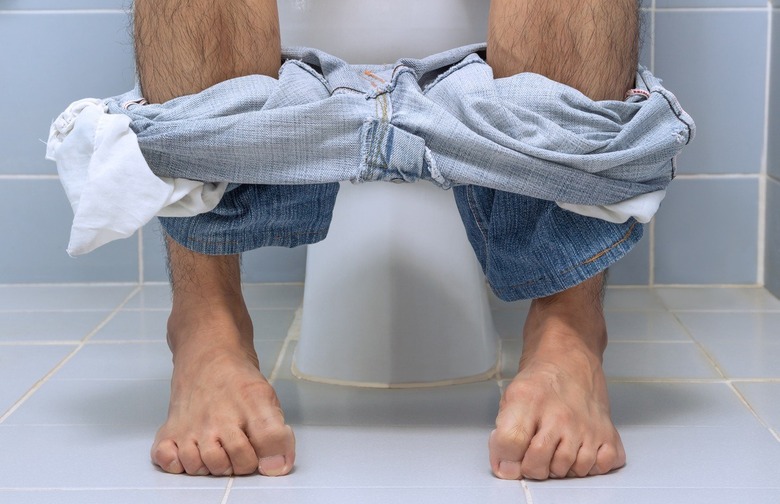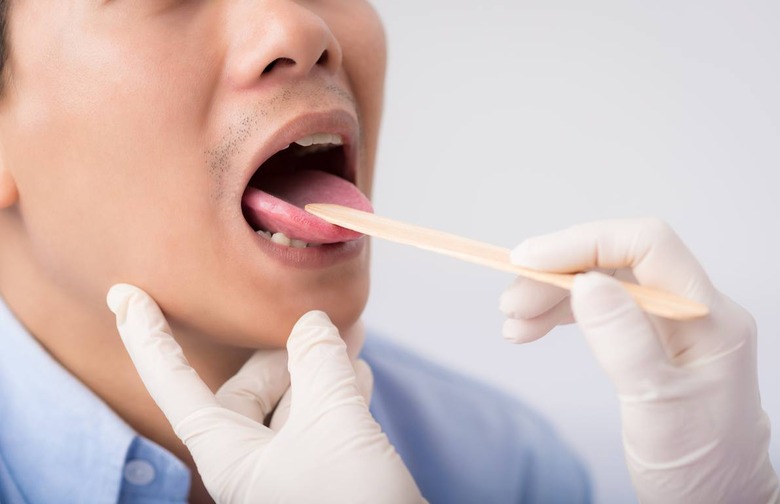Surprising Signs You Have A Vitamin Or Mineral Deficiency Gallery
You don't necessarily need a multivitamin or supplements to stay healthy — in an ideal world, you would be getting all the nutrients you need from your diet. But it's hard to know exactly what your body needs and when without the input of a nutritionist or a doctor.
Nutrient deficiencies can happen when you don't get enough of the vitamins and minerals you need over a long period of time. According to the Centers for Disease Control and Prevention's Second Nutrition Report, less than 10 percent of the U.S. population has deficiencies of most major vitamins and minerals. However, specific populations, such as pregnant women, infants, or the elderly, are still at heightened risk for such deficiencies, and a nutrient imbalance may lead to serious medical conditions.
Just because you may be susceptible to a vitamin or mineral deficiency at some point doesn't mean you need to run out to your local Vitamin World or GNC and pick up a tub of multivitamins or individual high-dose tablets or capsules. Dietary supplements come with their own set of risks; they may contain undisclosed additives or active ingredients that can have strong side effects, even sometimes interacting dangerously with prescription drugs.
The best way to approach a vitamin or mineral deficiency is to first identify whether you have one by consulting a doctor. The next steps should include either incorporating a supplement option or adding certain foods to your diet to address the specific deficiencies.
Watch for these 10 signs of a deficiency if you're concerned you might be missing something from your diet.
Michael Serrur and Holly Van Hare contributed to this roundup.
Brittle Hair
Hair health is a good indicator a nutrient deficiency. A lack of protein or iron can lead to brittle and dry hair. To stimulate hair follicle growth while also improving your iron absorption, try eating kiwi. The fruit contains vitamins C and E— two nutrients that improve iron absorption when consumed together. For more foods to eat for healthier hair, click here.
Diarrhea
A rich or decadent meal can lead to a loose bowel movement, but persistent episodes of diarrhea may be evidence that the body is not retaining nutrients. Staying hydrated by sipping liquids like tea or water between meals can help alleviate the symptoms, but it's also important to avoid alcohol, carbonated drinks, and greasy foods until the condition disappears. If you want to settle your stomach naturally, click here.
Frequent Bone Fractures
Weak bones are a sign of a calcium deficiency. The body draws calcium from the bones into the blood stream, but if the calcium is not replenished, it can lead to breaks and medical conditions such as osteoporosis. Try adding collard greens to your diet; its calcium is more easily absorbed by the body than that in dairy products. If collard greens aren't your favorite, try some of these other foods that benefit your bones.
Frequent Colds or Infections
Are you the one in the office who's somehow always getting sick? It might not just be bad luck — your immune system could be faltering. Immunity relies on proper nutrition to work at its best. Load up on orange juice, leafy greens, and other immune-boosting foods to replenish the nutrients you're missing.
High Blood Pressure
Causes of high blood pressure can range from excessive salt consumption to stress — but another potential cause is a deficiency in potassium, a mineral that helps relax your blood vessels. To ensure you're getting enough potassium in your diet, incorporate a banana into your morning breakfast routine, or bake a medium-sized potato for lunch. You might also want to avoid these foods that are putting your blood pressure through the roof.
Mood Swings
It's difficult to pinpoint the cause behind a mood swing: they can be triggered by a bad day at work, family issues, or even seasonal depression. But sometimes erratic waves of emotion are the result of a nutrient deficiency. Low energy, irritability, and feeling down are all indicators that you're experiencing an internal imbalance. Increasing your intake of B vitamins through consumption of lean meats, legumes, and green leafy vegetables can help balance your mood.
Muscle Cramps and Twitches
Magnesium is crucial co-factor for over 300 enzyme reactions in the body, but certain people, specifically pregnant women and the elderly, are often deficient in this crucial mineral. Not enough magnesium can lead to muscle cramps and twitches. Besides supplements (which should first be discussed with a doctor), magnesium can be incorporated into a diet through dark chocolate with high cacao content, citrus fruits, and whole grains.
Skin Issues
Your skin can tell you a lot about your diet. The elasticity and health of your skin is reliant on vitamins A, C, and E, as well as biotin and omega-3 fatty acids. If you don't get enough of these nutrients, your skin might become dry, acne-prone, and wrinkled.
Swollen Tongue
A swollen or abnormally red tongue is a marker of a vitamin B12 deficiency. B12 aids in the creation of red blood cells; when the body isn't absorbing enough of this essential nutrient, the papillae (the small bumps on the tongue) erode, giving it an abnormally smooth appearance. Add some seafood to your diet. Shellfish and mackerel are rich sources of B12. If you don't like sea creatures, sometimes a bowl of fortified breakfast cereal will also do the trick.
Unexplained Fatigue
Iron deficiency is the most common nutrient deficiency in the world, but it can largely go unrecognized because it shares symptoms with other conditions. Iron helps your body to transport oxygen, which is essential for normal physical and cognitive functioning. Iron-rich foods include beef, chicken liver, clams, and oysters; though plant-based foods such as lentils, beans, and spinach do contain iron, it is of the nonheme variety, which isn't as easily absorbed by the body. An iron deficiency isn't the only cause of fatigue, however. Talk to your doctor to rule out some of these other common reasons you might be feeling tired.










